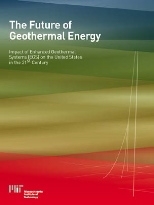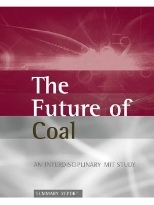MIT energy reports are making a difference in policy debates.
In January, an 18-member panel led by MIT Professor Jefferson W. Tester released an in-depth study titled "The Future of Geothermal Energy." Sponsored by the U.S. Department of Energy, it was the first study in some 30 years to take a new look at geothermal resources. The technology roadmap in the report, however, goes beyond "your mother's geothermal," that is, the mature and limited energy resource that relies on very shallow, active geothermal resources. Instead, the report focuses on developing very significant renewable energy supplies from novel "geothermal energy systems" that, by taking advantage of new drilling technologies, enable the circulation of water through hot rock very deep underground.
In March, an interdisciplinary MIT panel issued a report examining how the world can continue to use coal -- an abundant, inexpensive, environmentally challenged fuel -- in ways that mitigate instead of contribute to climate change. The study, "The Future of Coal -- Options for a Carbon-Constrained World," advocates a global leadership role for the United States, endorsing a program that, through the adoption of significant funding and policy actions focused on the design and implementation of large-scale, long-term carbon dioxide geological sequestration, enhances energy supplies, reduces global warming and increases energy security. A 2003 MIT interdisciplinary study took a similar look at nuclear power.
These MIT energy reports are already making a difference, providing both Congress and the executive branch with detailed recommendations to shape and influence the policy debate and responses. Tester, the H.P. Meissner Professor of Chemical Engineering; Ernest J. Moniz, director of the MIT Energy Initiative (MITEI); Institute Professor and MITEI council member John Deutch; MIT Washington, D.C. Office Director William B. Bonvillian; and several other faculty have testified before Congress numerous times over the past few months on topics ranging from coal use and carbon sequestration to geothermal energy and energy technology innovation policy.
In producing such reports, MIT plays a key role as an "honest broker," providing neutral ground to explore socially, technologically and politically weighted issues, said Robert C. Armstrong, deputy director of MITEI. Funded by entities without a political ax to grind or business to promote, these studies "allow us to make objective statements about what should be the priorities," he said.
Also in January, MIT organized an energy session at the World Economic Forum Annual Meeting 2007 in Davos, Switzerland. In addition to Hockfield, several MIT faculty were in attendance, including Angela Belcher, the Germeshausen Professor of Materials Science and Engineering and Biological Engineering and co-head of the MITEI Energy Education Task Force. Belcher spoke at the forum on how improvements in efficient use, materials and processes are key for the scalability of alternative energy technologies.
In February, Cambridge Energy Research Associates (CERA), a leading advisor to international energy companies, governments, financial institutions and technology providers, cosponsored with MITEI a daylong event on technological innovation and energy at CERA's annual conference in Houston. A number of MIT contributors participated, in addition to CERA chair Daniel Yergin, Pulitzer Prize-winning author of "The Prize: The Epic Quest for Oil, Money and Power."
MIT faculty members are collaborating with governments and organizations in Cyprus and Portugal on broad energy initiatives. President Olafur Ragnar Grimsson of Iceland visited MIT April 4 to discuss geothermal energy, climate change and other energy topics.
Closer to home, MIT has joined the Cambridge Energy Alliance, a nonprofit organization that aims to reduce significantly energy use in Cambridge. MIT administrators are serving on the group's organizing committee.
A version of this article appeared in MIT Tech Talk on May 9, 2007 (download PDF).







